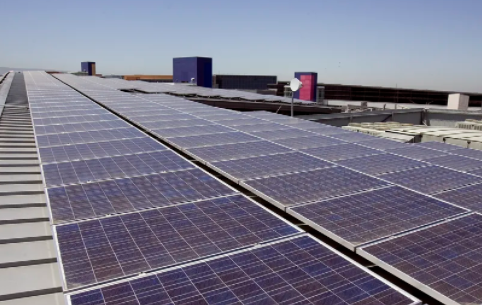Big Tech makes record clean energy purchases in 2021
Tech companies increased corporate purchases of clean energy last year, according to a new analysis from BloombergNEF.
Overall, corporations purchased a record 31.1 GW of clean energy in 2021, the equivalent of more than 10 percent of all new renewable energy capacity added worldwide that year. More than half the power purchase agreements for clean energy made by corporations were signed by tech giants including Amazon, Microsoft, Meta and Google.
Agreements with utilities or developers to buy enough clean electricity to match annual electricity use is a strategy companies use to claim they are running their operations on 100 percent clean energy. In fact, that clean energy doesn't usually flow directly to corporate offices and factories 24/7 because the grid they're connected to may not yet have enough renewable energy online. In other words, most power purchase agreements signed by US companies are considered "virtual".
“Companies like Google and Apple and Microsoft and Meta, they are the forerunners of the virtual power purchase agreement as we know it today,” Kyle Harrison, head of sustainability research at BloombergNEF, told The Verge. Still, tech companies need to make more progress to clean up their operations.
Data on Google's power purchase agreements last year highlight an emerging trend that could help companies reduce their pollution, while potentially getting more carbon-free energy onto the power grid. Google used to be the top corporate buyer of clean energy, but has lagged behind Amazon, Microsoft, Meta and a few other companies outside of technology. That's because Google is pioneering a new strategy to meet its environmental goals, which include meeting its electricity needs with round-the-clock clean energy, reports BloombergNEF. To do so, it is seeking various renewable energy investments and contracts in addition to traditional power purchase agreements.
Google first announced plans in 2020 to have clean energy for its data centers and campuses on a 24/7 basis by the end of the decade. Doing so involves investing in new technologies, emphasizing "smart policy" and bringing in new sources of clean energy. Energy Online. For example, in May, Google signed a deal with startup Fervo to develop a new geothermal project in Nevada that would eventually feed electricity to the local grid that serves Google's data centers. While solar and wind are still the most sought-after clean power sources by corporations, the shift toward 24/7 clean energy goals is likely to drive demand for other types of carbon-free energy that are heavily seasonally dependent. are not different. - such as geothermal, hydropower and nuclear power.
Last year, Microsoft announced a similar goal of matching its electricity use with renewable energy on a 24-hour basis. It still relies heavily on power purchase agreements, though Microsoft told The Verge last year that it was beginning to change its agreements in an effort to bring more clean energy to the local grid where it operates. The company was the second largest corporate buyer of clean energy in 2021.
Amazon, which has yet to make a 24/7 clean energy matching commitment, has undercut Microsoft to occupy the top corporate clean energy buyer spot for the second year in a row. According to BloombergNEF, Amazon's clean energy portfolio is now the 12th largest among all types of companies globally.
Companies outside of technology are not making the transition to clean energy with as much enthusiasm. While the total renewable energy purchased by corporations in 2021 was about 24 percent higher than the previous year, the total number of companies making clean energy purchases has actually declined.
"This dominance by technology is also a testament to the fact that this market hasn't expanded into other regions as fast as you might have expected," Harrison says.







No comments